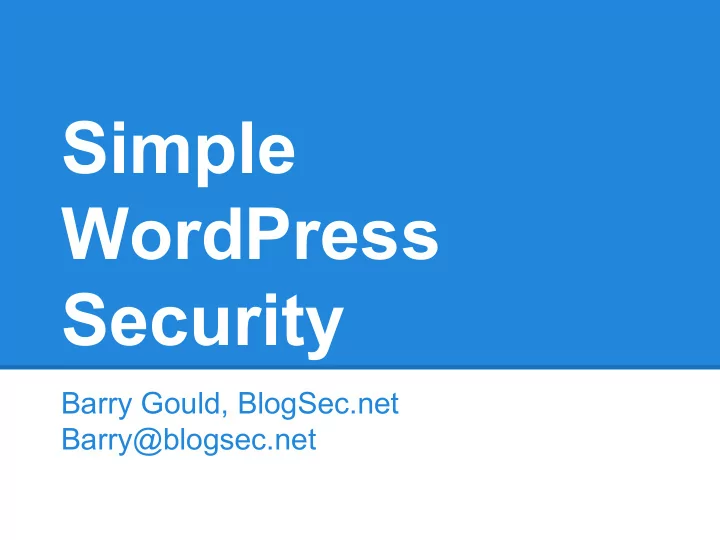

Simple WordPress Security Barry Gould, BlogSec.net Barry@blogsec.net
Why should we worry? Hacked site = Loss of business / reputation from loss of customer trust. Cleanup costs. Even ‘small’ sites are at risk; bots don’t discriminate! Threats: ● BotNets - password guessing or exploitation ● Spammers / Spambots ● Black Hat Hackers & Script Kiddies
Why should we worry? Ars Technica reports a BotNet with 90,000 IP addresses is trying to brute-force WordPress installs via password guessing.
Why should we worry? What are they after: ● admin accounts & user accounts ○ admin access ○ email addresses & passwords ● hack your site to direct traffic to another site ○ fake Viagra, etc. ● grow their botnets - use your servers to: ○ send spam / malware ○ hack other sites ● defacement of popular sites
How can I protect myself? Password Security Passwords should be UNIQUE, esp. for your own sites and your email. If you re-use passwords, when LinkedIn or Adobe gets hacked, now someone can login to your: ● email ● Facebook ● WP ● Bank Accounts
Password Complexity Use Strong passwords on Important sites: ● at least 8 characters (letters + numbers/sym) ● mix upper & lower case ● best not to use words or names ● but make it easy to remember PassPhrases: long but easy to remember ● AllRoadsLeadtoRom3. (19ch) ● movie quotes, song lyrics, jingles, etc. ● random words: CorrectHorseBatteryStaple
Passwords cont. Or, take a phrase & make a shorter password: ● All Roads Lead to Rome -> ArltR2013 (9ch) ● CorrectHorseBatteryStaple -> CoHoBaSt.
WordPress Accounts Separate Admin account; restrict use. Delete the default ‘admin’ account! Use Editor / Author / contributor account(s) instead of using Admin all the time. Only use Admin when needed. Each account should have a different password. (at least) 1 acct. for each human; don’t share!
Password guesser protection Plugin: “ Limit Login Attempts ” ● blocks attempts after 5 failed logins ● configurable # and timeout
Plugins & Themes Choose your plugins carefully. "7 out of top 10 most popular e-commerce plugins are vulnerable to common Web attacks "20% of the 50 most popular WordPress plugins are vulnerable to common Web attacks" - CheckMarx, June 2013 Many WP Themes have vulnerabilities as well.
Plugins & Themes Make sure all plugins & themes are safe & maintained / actively developed: ● get plugins/themes from well-known sites ● skip ones that haven’t been updated in years ● skip ones that don’t seem to have any community (forums, bug trackers, etc.) Make sure to keep everything updated! Delete themes & plugins you’re no longer using
Application Security Make sure to keep everything updated! ● WP + Themes & Plugins ● OS + Apache, PHP, etc. If using managed / shared hosting, make sure host keeps things updated, or reminds you to. Check regularly.
Operational Security Don’t login from shared computers, ever. (unless you’re using 2-factor auth) ● If you had to, change your password when you get to the office or home. Don’t login to anything from public networks / WiFi without SSL, SSH, SFTP ● sniffers can easily steal your password
Operational Security, cont. Run Anti-Virus software on your PCs & Macs. Use secure protocols, esp. on public networks: ● HTTPS / SSL instead of HTTP for admin ● SFTP / SCP instead of FTP ● SSH instead of Telnet Applies to Phones / Tablets too. Pay attention to browser/app certificate warnings.
Example Certificate Warning
Operational Security, cont. Backup regularly - Data + code ● Don’t leave backup files on the server ● code backups allow reference / diff in case of hack Don’t leave sensitive info on the server or in WP: ● inactive email lists ● billing info
Advanced Security Topics ● Don’t expose the database to internet ● change permissions on .htaccess! ● use a separate Dev/Staging site ○ or your PC - Desktop Server, XAMPP, Local WP... ● 2-Factor authentication ○ Google Authenticator on phone + WP plugin ● use Version Control software ● Firewalls ● WAFs (ModSecurity, etc.) ● IPS (Intrusion Protection System) ● VPNs
Advanced Security Topics Network / Vulnerability Scanning: Scan yourself, using Web Application Vulnerability Scanner(s): ● Nessus ● Nikto ● Acunetix ● OpenVAS Get familiar, then watch for changes
Further learning Books: WordPress 3 Ultimate Security (2011) Google is your Friend. Meetups - participate / ask questions!
Questions? Questions? Future Presentations?: ● eCommerce security / PCI DSS ● Advanced WP security / lockdown Contact me : Barry@BlogSec.net http://BlogSec.net
Recommend
More recommend